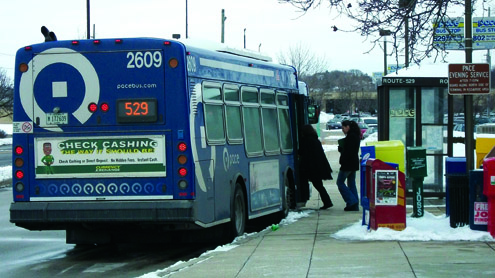
By Richard A. Kwasneski
Pace is extremely pleased for the Mid-Size Bus Manufacturers Association (MSBMA) to have recognized our transit agency for operating the nation’s largest fleet of small buses under 40 feet. We have worked hard to right size our fleet to the levels of demand and the operating environment of the areas we serve.
Pace began operations in 1984 after the Illinois State Legislature called for the conglomeration of several independent, disparate bus agencies operating throughout the Chicago suburbs. At that time, the prevailing logic was to apply urban transit methodology, which meant

the exclusive use of 40-foot buses. These served us very well for many years. However in a service area comprising urban, suburban, exurban and even rural environments, we needed to develop innovative solutions that involved smaller vehicles.
We began Pace dial-a-ride operations before they were required by the Americans with Disabilities Act (ADA), and created a vanpool program from scratch that has become one of the nation’s largest — all while some of our fixed routes with modest levels of demand were leading to a perception of big, empty buses in some areas. Nevertheless, with annual ridership consistently between 36 million and 40 million, our buses were obviously not empty.
Beyond the perception issue, we determined that smaller buses would use less fuel and create less noise and roadway impacts; important factors to the households and officials in some of the mostly residential areas we serve.
Pace operated a modest number of small and mid-size Chance and Orion buses in its fleet over the agency’s first 15 years, but had not made a large-scale purchase of smaller vehicles until 1999. At that time, the first of what would be over 100 35-foot, low-floor NABI buses entered our fleet. A funding shortage led to a hiatus on bus replacements for a few years beginning in 2003.
By 2006, we were in serious need of replacing many of our older, 40-foot buses that had aged beyond their intended life span. By this time, we were prepared to significantly increase our number of smaller buses. Because these buses cost less, we were able to replace more vehicles with the funds available. Between 2006 and 2010 Pace took delivery of nearly 225 ElDorado EZ-Rider II buses and most recently two 30-foot Orion VII Hybrid buses in 2012 – our first hybrid buses in the fleet.
We use the hybrids to study the impact this green technology has on our operations to guide future bus purchases. Our plans for 2013 include the conversion of one of our garages to operate CNG-powered buses, which we have slated for purchase over the next year.
Stakeholder response to the smaller buses has been overwhelmingly positive. Riders are pleased because the buses replaced models more than 20 years old. Operators and maintenance staff are happy about the increased reliability and modern features the buses provide, and taxpayers and elected officials are pleased that we listened to their suggestions to use smaller vehicles.
Internally, the reduced maintenance and fuel costs have a positive impact on our expenses, as the ElDorados get approximately 25 percent better fuel mileage than the 40-foot buses they replaced.
Many of our routes have always had ridership levels that demanded a 40-foot bus, and it is for this reason that we have entered into a new contract with ElDorado National for 40-foot buses to replace a number of Orion 40-foot buses that are coming due for retirement.
The passenger count information we receive from our Intelligent Bus System allows us to determine which trips require the use of larger and smaller buses to maximize passenger comfort and vehicle utilization. For instance, quite often a 30-foot bus can effectively serve the lesser passenger loads on weekends on routes that normally a 40-foot bus on weekdays, allowing us to save fuel and further reduce operating costs.
A mixed fleet of small and large buses works very well for our agency and customers because it allows us to operate a family of services ranging from vanpool to fixed route. Receiving this award from the MSBMA is a privilege that reinforces our pride in adding our small bus fleet to the many programs and initiatives we have that improve customer convenience and satisfaction and contribute to increased efficiency. BR
Richard A. Kwasneski serves as chairman of the Board of Directors for Pace Suburban Bus, Arlington Heights, IL.
